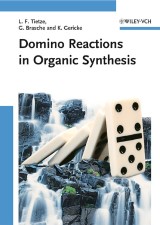Details

Domino Reactions in Organic Synthesis
1. Aufl.
|
214,99 € |
|
| Verlag: | Wiley-VCH |
| Format: | |
| Veröffentl.: | 13.12.2006 |
| ISBN/EAN: | 9783527608683 |
| Sprache: | englisch |
| Anzahl Seiten: | 631 |
DRM-geschütztes eBook, Sie benötigen z.B. Adobe Digital Editions und eine Adobe ID zum Lesen.
Beschreibungen
Domino reactions enable you to build complex structures in one-pot reactions without the need to isolate intermediates- a dream comes true. In this book, the well-respected expert, Professor Lutz Tietze, summarizes the possibilities of this reaction type - an approach for an efficiant, economically benificial and ecological<br> benign synthesis.<br> A definite must for every organic chemist.
Introduction<br> Cationic domino reactions<br> Anionic domino reactions<br> Radical domino reactions<br> Pericyclic domino reactions<br> Photochemically induced domino processes<br> Transition metal catalysis<br> Domino reactions initiated by oxidation or reduction<br> Enzymes in domino reactions<br> Multicomponent reactions<br> Special techniques in domino reactions<br>
"The book is nicely produced with very clear schemes. The text is concise but also a good read at the same time. This is a book that all serious synthetic organic chemists should add to their personal library...Domino reactions are one of the emerging philosophies in planning organic synthesis and their use should now be considered in every chemical synthesis whether in the laboratory or in industry - this book is an excellent guide." Chemistry World<br> <br> "The book is nicely produced with very clear schemes. The text is concise but also a good read at the same time. This is a book that all serious synthetic organic chemists should add to their personal library...Domino reactions are one of the emerging philosophies in planning organic synthesis and their use should now be considered in every chemical synthesis whether in the laboratory or in industry - this book is an excellent guide." Chemistry World<br>
Lutz F. Tietze studied chemistry at the universities of Freiburg and Kiel, Germany and obtained his doctorate under the supervision of Prof. B. Franck in 1968. He then worked as a research associate with Prof. G. Buchi at MIT, Cambridge, USA, as well as with Prof. A. Battersby in Cambridge, UK. Since 1978 he has been Professor and Head of the Institute of Organic and Biomolecular Chemistry at the Georg-August-University in Gottingen. His research focuses on the development of efficient and selective synthetic methods, combinatorial chemistry, the total synthesis of natural products and the design of new selective anticancer agents.<br> Professor Tietze has been awarded several prizes, including the award for his book on "Reactions and Syntheses" by the Fonds der Chemischen Industrie, the Grignard-Wittig Prize of the Societe Francaise de Chimie and the highly prestigious Emil Fischer Medal of the German Chemical Society. He is President of the German Zentralverband der Chemie and a member of the Council of the German Research Association. He has over 360 papers, 31 patents and three books to his name. <br> <br> Gordon Brasche, born in 1976 in Wernigerode, Germany, studied chemistry at the University of Gottingen, gaining his diploma and doctorate under the supervision of Prof. Tietze with a thesis on the synthesis of new highly active analogous of spinosynes. During his doctorate he worked as a teaching assistant for medical and advanced organic chemistry students.<br> <br> Kersten Matthias Gericke, born in 1976 in Wilhelmshaven, Germany, studied chemistry at the University of Gottingen. He gained his diploma and doctorate under Prof. Tietze, achieving several total syntheses of biological highly potent anthraquinone antibiotics. He also was a teaching assistant for medical and advanced organic chemistry students.
The formation of complex molecules in only a few steps has always been a dream among chemists. That this is possible can be seen in nature, where complicated molecules such as palytoxin, maitotoxin and others are made in a highly efficient way. This dream has now almost become true for bench chemists with the development of domino reactions.<br> Domino reactions are the key to sequences of chemical transformations, which allow products to be synthesized in one-pot in a simple, efficient and elegant way without isolating any intermediates. Such reactions can not only be employed in basic research but also in applied chemistry and their use has a twofold advantage. On the one hand for industry, since the costs of labor, waste management, energy as well as chemicals decrease, and on the other hand their use is beneficial for our environment, since they help to save our natural resources and lighten the burden on our environment. It is therefore not surprising that this new concept has been rapidly adopted by the scientific community.<br> Containing over one thousand citations, this book covers novel reaction sequences right up to the middle of 2005 while also including important older work. Moreover, some recent work from as recently as 2006 is also discussed. <br> Written by the well-respected expert Professor Lutz Tietze and his students, Gordon Brasche and Kersten Gericke, who analyze the potential of this revolutionary concept, this is a definite must for every organic chemist at universities and research institutions, as well as those working in the chemicals industry.

















